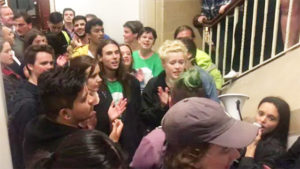Home » Commentary » Opinion » Teaching universities freedom of speech 101
· The Daily Telegraph

 One of the greatest threats to free speech in Australian universities is that those in charge of higher education refuse to admit the free speech problems that stare them in the face.
One of the greatest threats to free speech in Australian universities is that those in charge of higher education refuse to admit the free speech problems that stare them in the face.
In a speech this week, former Labor politician and chancellor of the Australian National University, Gareth Evans, argued that claims of a free speech crisis in our universities were overstated because there had been only “a handful of instances of invited campus speakers espousing various perceived heresies being disinvited or shouted down by rival activists”.
Downplaying the problem by focusing on the quantity of such incidents is a flawed way of judging whether one of the fundamental principles of a democratic society is endangered.
It is the incidence — not the prevalence — of restrictions on free speech that counts.
It does not matter if there are one, or 100, or 1000 violations of this crucial principle.
If any speaker is prevented from discussing certain ideas that others deem ‘controversial’ — such as the cancellation earlier this year by the University of Western Australia of a speech by an American academic who questions the science around transgenderism — then there is no free speech on campus.
Any failure by universities to properly protect free speech represents a fundamental failure to fulfil the role that taxpayers fund them to play: promote free and open inquiry.
But those in charge of universities just don’t get this.
In September, psychologist Bettina Arndt gave a speech at Sydney University that questioned the existence of a ‘toxic rape culture’ among young male university students.
When demonstrators blocked audience members from attending the venue and overwhelmed security guards, the speech was only able to go ahead after the riot police were called in to clear out the demonstrators.
But Sydney University vice-chancellor, Michael Spence defended the demonstrators by saying they were simply exercising their legitimate right to protest and engage in counter-free speech. According to Spence, “free speech is alive and well” in universities.
In reality, this was an example of the ‘no platforming’ phenomena prevalent in North American and British colleges and universities, which has seen numerous speakers banned and prevented from speaking on university and college campuses because their views are deemed ‘offensive’ or ‘hurtful’ to some students.
Nevertheless, this didn’t stop Vicki Thomson, the chief executive of the Group of Eight peak university lobby group, from dismissing the need for universities to take action on free speech because she “couldn’t remember a particularly violent protest (on university campuses) in the past 10 years.”
Such wilful blindness to international trends and local examples of anti-free speech behaviour explains the mounting calls for universities to implement policies that properly protect thought and expression on Australian campuses — calls led by former High Court Chief Justice, Robert French, who the federal government has appointed to conduct an inquiry into the issue.
One way forward would be for Australian universities to voluntarily adopt the charter, the Statement on Principles of Free Expression, introduced by the University of Chicago in 2014 and subsequently adopted by 45 other American universities.
Signing up to the ‘Chicago Principles’ would not only affirm that a university is committed to “free and open inquiry in all matters”. and to protecting “the broadest possible latitude to speak, write, listen, challenge, and learn”.
It would also target and punish anti-free speech “disruptive conduct” by stipulating that protesters have no right to “obstruct, disrupt, or otherwise interfere with the freedom of others to express views they reject or even loathe”.
However, if university administrators are unwilling to admit free speech problems exist, how can they be trusted to self-regulate and implement free speech solutions?
In the Canadian province of Ontario, the newly-elected Progressive Conservative government has announced that all universities will be required to develop, implement and comply with free speech policies based on the Chicago Principles.
Moreover, any university that is found to have failed to introduce and follow a free speech policy as required may face funding cuts.
If the federal government implemented a similar policy here, tying funding to complying with free speech policies and protections, it would actively spur university authorities to address free speech problem on campus.
This would especially focus the minds, once funding was at stake, of those administrators whose complacent ‘see no free speech problem’ attitudes is a major obstacle to ensuring universities properly protect free speech.
Dr Jeremy Sammut is the director of the Culture, Prosperity and Civil Society Program at The Centre for Independent Studies and author of the report University Freedom Charters: How to best protect free speech on Australian Campuses
Teaching universities freedom of speech 101